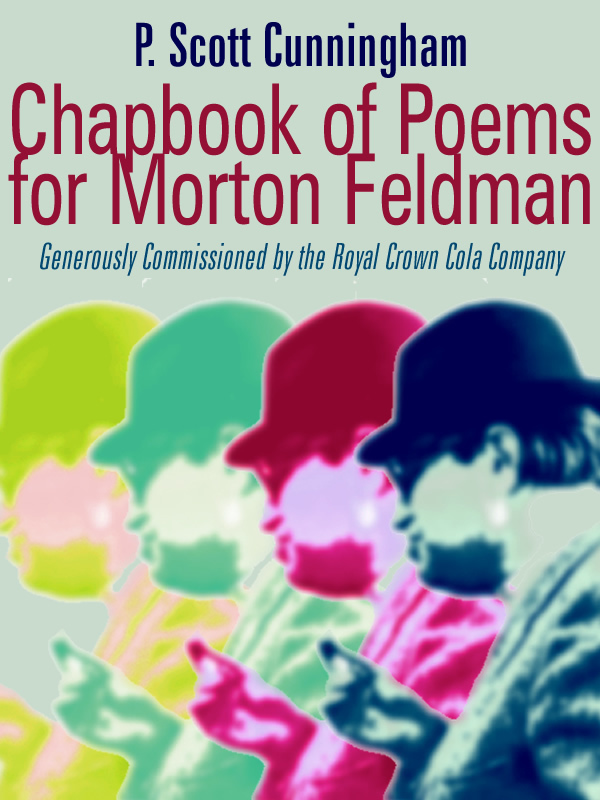Life. It rots. On its own tree
no less. False promises of love and worse—
Rape. Murder. Peace
a word for something besides peace—
a moment, a break, the cool flavor
of a natural salve poured across the tongue—
fresh raspberries and cinnamon wavering
beneath the surface—breath into the lungs.
Let it slowly fill your chest, Lost Soul,
fallen like the rest of us from the garden's
uppermost branches, left for dead, then
saved and given music, food and drink—
this is the tradition in which we are found.
This is Morton Feldman. This is Royal Crown.
This is Royal Crown. This is you
beside the roar of the family hearth,
feet stockinged and propped on an ottoman,
pipe shoved comfortably into your mouth,
a beautiful woman, her legs bare
between the woven skin of a Scottish blanket
and the complex patterns of a Turkish rug,
her arm linked with yours, shoulder to shoulder.
Satisfied? Not quite! Now throw on some
music: Morton Feldman's Piano
and String Quartet—79 minutes
of shimmering near silence and woe—
Relax. Feel your heart's armor melt down.
Listen to Feldman! Drink Royal Crown!
Drink Royal Crown! Listen to Feldman!
Be born with him between the tumid bricks
of Queens as a midwife yells at him
to pick up the pace of his head-first exit,
this pair of scissors, he already knows,
is not his mother—everything moves too quickly.
Even sound, which for the last nine months
was hushed and gentle, pricks his head
in ways that make him long for a return
to liquid's deafness, the comfort we seek
whenever, thirsty from the sun's eternal
scrape, we stop by our local pharmacy
for that pop-equivalent to Morton's sound—
The Feldman-cola: the one with the Crown.
Drink Royal Crown! Listen to Feldman!
Walk with him through post-war Berlin;
fans asking for autographs on albums
as if he were that more recent Lennon
and not the Ringo Star of New York composers,
who cannot take a step in Germany
without feeling what kind of voices pool
beneath the paving stone. They scream at me
he says, and rides the tram staring at
the tracks, the wires tumescent with e-
lectricity, pine trees bleeding sap
and every guttural voice—though friendly—
calling up the faces of the drowned.
(This message brought to you respectfully.)
Buy Royal Crown! Listen to Feldman's
Projection I through V. Feel dumb? Confused?
No problem. If you have an extra grand,
our Feldman scholars will guide you through
all hundred and something compositions
in the privacy of your home with RC's
Feldman: It's Not an Inquisition! tapes.
Just call the number on your TV
and in four to six weeks we'll deliver
a PhD's worth of Feldman know-how
in fun, easy-to-listen-to slivers
that you can even time to your workouts.
Now who's aleatory music-bound?
You are, Feldman Expert! Thanks Royal Crown!
Thanks Royal Crown! And thanks Feldman
for all the moments on commuter trains
when Journey's Don't Stop Believing faded out
and nothingness seemed to take its place—
a cavernous auxiliary silence hidden
wondrously in your iPod, but no, the screen says
Rothko Chapel, downloaded last week
after reading a piece by some writer
from the New Yorker. The softness demands
you bend "like a hummingbird" to its flower,
the notes like words not written but embossed
on the heart's skin and flooded, though
you'd rather not work so hard for sound,
would rather eat, sleep, and drink Royal Crown.
Eat, drink, sleep under your own roof—
isn't that the dream the Feldmans had when
they sailed for Queens, fleeing the Soviets?
Their own brownstone, a factory for children's
clothes and all the hard-earned profits
under their mattress, not some party boss's?
The means to meet their grandson's demands
for private music lessons, his own grand
piano at twelve years old, a Steinway—
the name itself like Sinatra's mantra.
In America, we don't ask for help.
We sew our own pants; patent recipes
for delicious soft drinks fit for a king—
Feldman means freedom. We make freedom's drink.
So drink a Royal Crown for freedom's sake
and buy an album by Morton Feldman—
classical music from these United States
composed in defiant opposition
to left-wing, continental snobbery.
Music that embraces self-reliance,
self-invention, one God, indivisible
with justice and liberty for those souls
who crawl to His feet with a thirst to slake,
music that, like the Lord's, tolls quietly
needs no system, no puppet strings,
no two dollar words or avant-bureaucracy.
Just one man, obsessed with pure sound.
Listen to Morton Feldman. Drink Royal Crown.
